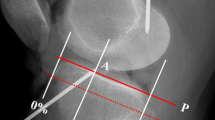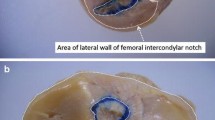Abstract
Introduction
Individual variations in the anatomy of the knee joint have been suggested to affect the ability to functionally compensate for ACL insufficiency or to put an individual at an increased risk of ACL injury. These variations include the posterior tibial slope, the concavity of the medial tibial plateau, the convexity of the lateral tibial plateau, and the configuration of the femoral condyles.
Method
This anatomical study investigates if there is a correlation between the individual surface geometry of the femorotibial joint and the morphometry of the ACL. These data were assumed to provide evidence whether or not the functional stability of an ACL-insufficient knee may be derived from its radiographic surface geometry. Standardised measurement techniques were used to analyse the surface geometry of 68 human cadaver knees. Data were correlated with the cross-sectional area, the area of insertion and position of the footprint of the ACL and its functional bundles.
Results
Analysis revealed that there was a significant, but weak correlation between the femoral and tibial area of ACL insertion and the depth of the medial and lateral femoral condyle. No correlation was found between the surface geometry of the femorotibial joint and the cross-sectional area of the ACL. The results of this anatomical study suggest that the relationship between the joint surfaces and the morphometry of the ACL primarily is a function of size of the knee joint.
Conclusions
Based on our results, there is no evidence that the stability of the knee can be derived from its radiographic surface geometry.





Similar content being viewed by others
References
Allen CR, Wong EK, Livesay GA, Sakane M, Fu FH, Woo SL (2000) Importance of the medial meniscus in the anterior cruciate ligament-deficient knee. J Orthop Res 18:109–115
Andriacchi TP, Dyrby CO (2005) Interactions between kinematics and loading during walking for the normal and ACL deficient knee. J Biomech 38:293–298
Barrance PJ, Williams GN, Snyder-Mackler L, Buchanan TS (2006) Altered knee kinematics in ACL-deficient non-copers: a comparison using dynamic MRI. J Orthop Res 24:132–140
Barrance PJ, Williams GN, Snyder-Mackler L, Buchanan TS (2007) Do ACL-injured copers exhibit differences in knee kinematics? An MRI study. Clin Orthop Relat Res 454:74–80
Bernard M, Hertel P, Hornung H, Cierpinski T (1997) Femoral insertion of the ACL. Radiographic quadrant method. Am J Knee Surg 10:14–22
Bull AMJ, Earnshaw PH, Smith A, Katchburian MV, Hassan ANA, Amis AA (2002) Intraoperative measurement of knee kinematics in reconstruction of the anterior cruciate ligament. J Bone Joint Surg Br 84:1075–1081
Buss DD, Min R, Skyhar M, Galinat B, Warren RF, Wickiewicz TL (1995) Nonoperative treatment of acute anterior cruciate ligament in a selected group of patients. Am J Sports Med 23:160–165
Ciccotti MG, Lombardo SJ, Nonweiler B, Pink M (1994) Non-operative treatment of ruptures of the anterior cruciate ligament in middleaged patients. J Bone and Joint Surg 76:1315–1321
Daniel DM, Stone ML, Dobson BE, Fithian DC, Rossman DJ, Kaufman KR (1994) Fate of the ACL-injured patient. Am J Sports Med 22:632–644
Fridén T, Jonsson A, Erlandsson T, Jonsson K, Lindstrand A (1993) Effect of femoral condyle configuration on disability after an anterior cruciate ligament rupture. Acta Orthop Scand 64:571–574
Georgoulis AD, Papadonikolakis A, Papageorgiou CD, Mitsou A, Stergiou N (2003) Three-dimensional tibiofemoral kinematics of the anterior cruciate ligament-deficient and reconstructed knee during walking. Am J Sports Med 31:75–79
Giffin JR, Vogrin TM, Zantop T, Woo SLY, Harner CD (2004) Effects of increasing tibial slope on the biomechanics of the knee. Am J Sports Med 32:376–382
Girgis FG, Marshall JL, Monajem A (1975) The cruciate ligaments of the knee joint. Anatomical, functional, and experimental analysis. Clin Orthop Relat Res 106:216–231
Gray DJ, Gardner E (1950) Prenatal development of the human knee and superior tibiofibular joints. Am J Anat 86:235–287
Hashemi J, Chandrashekar N, Mansouri H, Gill B, Slauterbeck JR, Schutt RC Jr, Dabezies E, Beynnon BD (2010) Shallow medial tibial plateau and steep medial and lateral tibial slopes: new risk factors for anterior cruciate ligament injuries. Am J Sports Med 38:54–62
Heegaard JH, Beaupré GS, Carter DR (1999) Mechanically modulated cartilage growth may regulate joint surface morphogenesis. J Orthop Res 17:509–517
Iwaki H, Pinskerova V, Freeman MAR (2000) Tibiofemoral movement 1: the shapes and relative movements of the femur and the tibia in the unloaded cadaver knee. J Bone Joint Surg Br 82:1189–1195
Katz MP, Grogono BJ, Soper KC (1967) The etiology and treatment of congenital dislocation of the knee. J Bone Joint Surg Br 49:112–120
Kohn D, Moreno B (1995) Meniscus insertion anatomy as a basis for meniscus replacement: a morphological cadaveric study. Arthroscopy 11:96–103
Kostogiannis I, Ageberg E, Neuman P, Dahlberg LE, Friden T, Roos H (2008) Clinically assessed knee joint laxity as a predictor for reconstruction after an anterior cruciate ligament injury: a prospective study of 100 patients treated with activity modification and rehabilitation. Am J Sports Med 36:1528–1533
Kujala UM, Nelimarkka O, Koskinen SK (1992) Relationship between the pivot shift and the configuration of the lateral tibial plateau. Arch Orthop Trauma Surg 111:228–229
Kvist J, Gillquist J (2001) Anterior positioning of tibia during motion after anterior cruciate ligament injury. Med Sci Sports Exerc 33:1063–1072
Levy IM, Torzilli PA, Warren RF (1982) The effect of medial meniscectomy on anterior-posterior motion of the knee. J Bone Joint Surg 64:883–888
Liu W, Maitland ME (2003) Influence of anthropometric and mechanical variations on functional instability in the ACL-deficient knee. Ann Biomed Eng 31:1153–1161
Luites JW, Wymenga AB, Blankevoort L, Kooloos JG (2007) Description of the attachment geometry of the anteromedial and posterolateral bundles of the ACL from arthroscopic perspective for anatomical tunnel placement. Knee Surg Sports Traumatol Arthrosc 15:1422–1431
Marans HJ, Jackson RW, Glossop ND, Young C (1989) Anterior cruciate ligament insufficiency: a dynamic three-dimensional motion analysis. Am J Sports Med 17:325–332
Matsumoto H (1990) Mechanism of the pivot shift. J Bone Joint Surg Br 72:816–821
Mensch JS, Amstutz HC (1975) Knee morphology as a guide to knee replacement. Clin Orthop Rel Res 112:231–241
Mérida-Velasco JA, Sánchez-Montesinos I, Espín-Ferra J, Mérida-Velasco JR, Rodríguez-Vázquez JF, Jiménez-Collado J (1997) Development of the human knee joint ligaments. Anat Rec 248:259–268
Rudolph KS, Eastlack ME, Axe MJ, Snyder-Mackler L (1998) Movement patterns after anterior cruciate ligament injury: a comparison of patients who compensate well for injury and those who require operative stabilization. J Electromyogr Kinesiol 8:349–362
Shoemaker SC, Markolf KL (1986) The role of the meniscus in the anteriorposterior stability of the loaded anterior cruciate-deficient knee: effects of partial versus total excision. J Bone Joint Surg 68:71–79
Siebold R, Ellert T, Metz S, Metz J (2008) Tibial insertions of the anteromedial and posterolateral bundles of the anterior cruciate ligament: morphometry, arthroscopic landmarks, and orientation model for bone tunnel placement. Arthroscopy 24:154–161
Stijak L, Herzog RF, Schai P (2008) Is there an influence of the tibial slope of the lateral condyle on the ACL lesion? A case-control study. Knee Surg Sports Traumatol Arthrosc 16:112–117
Todd MS, Lalliss S, Garcia E, DeBerardino TM, Cameron KL (2010) The relationship between posterior tibial slope and anterior cruciate ligament injuries. Am J Sports Med 38:63–67
Conflict of interest
The authors declare that they have no conflict of interest.
Author information
Authors and Affiliations
Corresponding author
Rights and permissions
About this article
Cite this article
Dargel, J., Schmidt-Wiethoff, R., Feiser, J. et al. Relationship between human femorotibial joint configuration and the morphometry of the anterior cruciate ligament. Arch Orthop Trauma Surg 131, 1095–1105 (2011). https://doi.org/10.1007/s00402-011-1345-y
Received:
Published:
Issue Date:
DOI: https://doi.org/10.1007/s00402-011-1345-y




